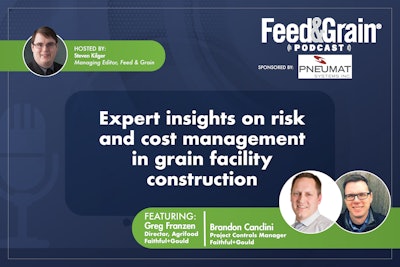
In this episode of the Feed & Grain Podcast, host Steven Kilger interviews Greg Franzen and Mark Herbert from Faithful+Gould about best practices for construction projects in the feed and grain industry. The experts emphasize the importance of risk management, advising companies to maintain a simple yet comprehensive risk log involving the entire team. They also discuss strategies for maximizing value and protecting investments throughout the construction process. This informative conversation provides valuable insights for industry professionals planning new facilities or major renovations.
Steven Kilger - 00:00
Hello! My name Steven Kilger, I’m the managing Editor for Feed & Grain Magazine and the host of the Feed & Grain Podcast. Thank you so much for joining me today as we dive deep into the issues affecting the feed manufacturing, grain handling and allied industries.
Today’s episode is brought to you by The BinWhip from Pneumat Systems. The powerful Dual Impact BinWhip removes the toughest buildup and blockages in industrial storage silos – without hazardous silo entry. Learn more today at binwhip.com.
Today my guests are Greg Franzen and Mark Herbert from Faithful+Gould, a global consulting firm specializing in agribusiness construction projects. They’re here to offer guidance on managing construction projects in feed and grain industry.
I hope you enjoy the interview. If you want to help out with the podcast and are listening to this in a podcasting app please rate us and subscribe! If you’re listening online signup for the Feed & Grain Newsletter Industry Watch to see when new podcasts drop and stay up to date with all of the news from around the industry.
Now onto the show.
Kilger - 01:02
You mentioned earlier about part of your project charter was to go through and have an idea, a general kind of idea of what risks might come up during the project, what things might happen, and then putting some kind of price on those or ability to move within your budget to address them, right? So what are some of the items to consider when you're brainstorming the costs of a given risks and those risks overall?
Greg Franzen - 01:31
You know, all the planning in the world and Great design and engineering can go a long ways to eliminate many risks. However, we do not live in a perfect world and everyone knows that and it's important to most clients will recognize those risks, create a contingency budget line item in their overall budget so that there's funding available to cover cost risks. However, some of the cost risks may be known when you're going into the project, but some are not and so the idea behind managing cost risk is to work with the engineer, work with the contract and develop a risk log. What is it that's out there that potentially is at risk? Is there cost escalation on certain pieces of equipment because it wasn't ordered on time? Is flooding kind of a big subject this time of year and in some parts of central US with and all of that and how that might affect a project.
So there's all sorts of things like that and so it's a matter of just capturing them, documenting them, putting them in a simple spreadsheet and calling them what they are and what the risk to the project is.
Is it a cost issue and then what might that cost? Is it $100,000, a million dollars?
And then, you know, what's the likelihood or probability of it happening? And so you can make it as complicated as you want, but seems to me that it's best to keep it simple. But what's more important is to work with the entire team because you as a client, you're not aware of everything and so involving the engineer, involving the architect, involving the contract and meeting regularly to address these items and that using that risk log to help inform how you're gonna spend, you may spend part of your construction contingency and so It all sort of works together and so doing that and you're being proactive, you're trying to come to, you always want to, as a project manager or a cost manager, you always want to be able to forecast what the whole project's going to cost at completion and so the cost to risk a lot will help you do that because it'll help give you visibility to what you maybe can't see all on your own.
Mark Herbert - 03:36
Yeah, Greg made a bigger point, don't overthink it. You can go and lift some deep weeds with this stuff on probability but keep it simple. Cater to the audience. I mean, the key there that Greg said is you need to defend. So, if the entire group is satisfied with the approach, then that's the approach. Don't overthink it. One thing that needs to be considered though, the sum total of these risks.
If you look at a few and you treat them as bee stings and everything's fine, when you step back and look at all of them, all hundreds of them bee stings. I think maybe this project should move forward because of this or we approach it from a different direction, a different approach, something that affects folks. Don't forget the big picture and accounting for risk because the risk is just important and going through each one. But then a lot of times what we do is the idea of what is the impact of all of this? Not just one or two and chasing them here and there, but taking it as a whole in how we continue.
Franzen - 04:32
I think the other thing to keep in mind is that executives and board members, no one likes surprises. Finding out their project is going to be over budget and so keeping track of risks is a way to keep team, all project stakeholders informed about what could potentially come up. I mean, no one likes to pay more than they have to for a project.
What they like less than that is to be surprised by a cost overrun.
If people are informed all the way along the path of the project, people can address it and deal with it in a proactive way instead of being surprised. And so the Risk Lab really can help with that. We all have our experience with what happened with project costs during the pandemic and during the Subsequent cost escalation hockey stick that kind of followed.
A lot of projects went way over budget because of the cost escalation. Right now I think we're running 5-7% in construction cost escalation. And where's that going? What are the trends? What do we think is going to happen?
Kilger - 05:35
It's that old saying, hope for the best, plan for the worst, it's better to know and not be surprised. And that's really what a lot of the project chartering things are, right? It's about documenting and all of these things come down to the same thing, which is mitigating the chance of a big surprise coming and derailing the entire project. At least that's what seems to me. What advice do you have for clients and contractors on effectively managing project costs throughout the lifestyle?
Franzen - 06:01
Effectively managing costs. Well, Mark, I'll maybe let you jump in and pick this one. Obviously the first step is to have a good budget that's based on good, solid information.
And so sometimes what clients do is that they'll go out to contractors and get pricing, get bids, and they'll assemble it, and then they'll just add X percent for contingency. Well, I mean that's one way to do it. Of course we're consultants so we're big believers in having an independent third party at least do a cost estimate validation of what the client has pulled together for a budget just because you know so early on if you're having contractors do budget pricing it may be accurate that there may be some gaps into it so that's why having that independent third party do a cost estimate validation give the client confidence that hey she you know This contract could provide a national letter or we did this estimate in house.
Having a third party validate it, look for holes, gaps, so starting out with a proper budget is step number one to managing costs. You want to make sure that the foundation is solid and as we talked about a few minutes ago with managing cost risks, just staying on top of the potential change order items and risks and addressing them in a timely fashion so that the contractor is able to keep going and there are delays.
Herbert - 07:24
A lot of times also the budget is a foundation and so I see a lot of clients they'll get pressured unfortunately and to lower prices. Upper management obviously doesn't want to spend money if they don't have to and so unfortunately, we make it x percentage less or make this less cost or you know why is this so expensive and so that unfortunately What happens is we start driving down prices when we don't fully know why it's just because someone's request is in. And that's a delicate situation because you have to walk through the politics of it. Um, and yes they are right but they're also wrong. We need to be educated on what costs we're assigning. We don't get a range of estimates and just grab the lowest one.
We can grab the lowest one if it's validated and we understand why. So that unfortunately I see that owe quite a bit money runs out because the plan was wrong to begin with. It was based on assumptions and almost a fear unfortunately sometimes.
So having that money approach from the get-go just as a philosophy will help guide this project to success. And yeah that's the foundation and then working through it you make a plan you work the plan and then you change the plan and then you work a new plan because change is constant You have to be able to roll with it. That idea of catering from the get go, how you're doing your documentation, you're doing your cost management, it's a philosophy approach so that you can infinitely expand and roll a change for the rest of your project. Because a lot of times that's where they trip up to because people look at a system and go, this is the way we've done it and this is the way we're going to keep doing it because I don't know how to change.
Herbert - 09:02
We need to create the attitude, being the system, need to be ready to easily set change from the get go.
Franzen - 09:09
That leads into a whole other subject of the whole change management process. Sometimes what happens is that, you know, there'll be a corporate capital project at a processing plant that'll be designed, there'll be an estimate, but then pretty soon the plant. as all these changes they want to make may be for good reason and may be a ton of benefit. What ends up happening is that the scope of the project changes or the cost changes, the schedule may change and having a good change management process and good decision management and good project management is we really needed.
Kilger - 09:39
Yeah, it's a really good point that all of this and everything we kind of talked about so far is really about giving people flexibility to big changes, right? Because a lot of people might say like, oh, well, now that we have the project charter, this is what we're going to stick to, but that's not really the idea, right? The idea is like, oh, we have this and we have flexibility in so that when we found out later that the Mississippi River is going flood. This year we can make those changes without losing everything. Last question for you, for today at least, what are your most critical issues for owners and contracts to discuss before they sign a project, before they sign a contract for a project?
Franzen - 10:17
So we have a pretty good list here. We'll talk about a few of them. I mean, it starts with form of contract. You know, contracts are important because they're obviously a legal document that informs the contractor and informs the client and the engineer how, what we're going to agree to and how it's going to be done. And so, for instance, if there's a guaranteed maximum price of GMP to a contract, you know, as the client, you want to make sure you have a complete understanding. The full buildup of the GMP budget and again I'm going to just make a plug for an independent third party estimate to validate the contractor's budget to understand what are the gaps, if there are allowances built in, how are they built up, if there contingencies, how are the contingencies to be used, is the contingency the contractor to use exclusively.
Or is it a shared news? All of those sorts of details are important. And so, you know, if the contract is doing self-performed work where they're not the contractor's not, for instance, let's say it's concrete. And so they won't be bidding that scope of work out. So that's where I think independent third party estimate of that contractor's self-performed work is just a requirement. So you as an owner have a basis of preparation.
and so you really understand what you're buying.
So Mark has done a really good job with understanding cost and schedule reporting requirements over the years. Mark is a project controls manager and deals with cost management and schedule management and so he knows what's necessary to from a reporting standpoint to understand you know that the relative health of the project and so one of the things that is important to include in any contract with a
contractor is spell out what are the reporting requirements that you as an owner expect. I want to, we need a critical path method schedule on a monthly basis, we need a three week look ahead, you know, weekly basis. So, lifting out all of those schedule reports and cost reports. We want a cash flow report, and we need the cash flow report monthly. So Mark, feel free to jump in and go ahead.
Herbert - 12:27
A lot of the, know, critical issues. Another big one is how is the contractor going to manage the contract? Because again, the owner, it's their money, right? So they have every right to understand what's happening with their money. So the contractor says, yeah, we'll build a courier. I wouldn't feel comfortable with that. Yeah, talking with them on, hey, are you going to plan this and actually build a schedule?
Are you going to use management techniques? What kind of management techniques are you going to use? Is this going to be daily band down meetings during the concrete structural process of this? And then we switch over to sort of a last approach with planning boards on site for the mechanical trades that come in and overlap each other and then we switch to lean and just-in-time techniques for arrivals and deliveries and understanding how the management is going to going into this will set this up for success because these are processes that just work, they're planned, they weren't planned and then one day the project done and everybody happy, but without knowing how you're going to manage that all of a sudden it's go time and people stand around looking at each other going, what do we do now? We're supposed to be doing things, you know?
So that critical understanding how they're going to manage the project, not only just the project, but the different phases that the project's going to be in through a lifecycle. And another good one that a lot of people don't think of and like a bonus is going to be more risk sharing. And this is a tough one because in the construction industry, it's a pretty macho industry. So telling these people that, hey, we need to be partners here. They don't like that idea. They're like, we want to push all the risk off on somebody else. Well, That might not be the best approach.
Talking with these contractors and weighing out the risks and opportunities and sharing these is actually proving in my experience to be very productive and a win-win for everybody. Because if it's a lose for somebody and a win for somebody else, the person that won is still going to lose because they're fighting them.
Kilger - 14:24
Thank you for the bonus. No, that's great advice.
And those are all the questions I have. Like I said, I think we just are scratching the surface of this topic, so I really do hope you guys come back again. But for now, is there anything you think I've missed? Anything you want to add?
Also, I will also put out there, yes people, get consultants. They get a bad rap from TV, but I've only them to be very nice pleasant people who want to give you an expertise that you probably don't have just sitting around on your own payroll. So I think what you guys do great. Any other anything else you want to tell our audience?
Franzen - 14:57
I think the only thing that comes to mind right now is that we happen to work with a client right now and they're negotiating with a contractor for a scope of work and having for an owner to have a consultant in their corner advising them has been really helpful and just from if nothing else from a coaching standpoint we all need input we all need an advisor or someone to you know speak into our lives to help us grow and develop as people and so Having someone, whether that's someone from the company that's there to advise and support or having that consultant that has the experience is just, I think, a real confidence booster to a project team to have someone to go to in a firm or provide other options, ideas for considerations. No one likes to do it alone, really. So we'll leave support from others that have experience.
Kilger - 15:52
All right. Well, thank you again so much for talking to me, Greg, Mark. It was a real pleasure. I hope you had a good time. And for everyone else out there listening right now, make sure you stay safe and we'll see you next time.
.jpg?auto=format%2Ccompress&crop=faces&fit=crop&h=48&q=70&w=48)


















